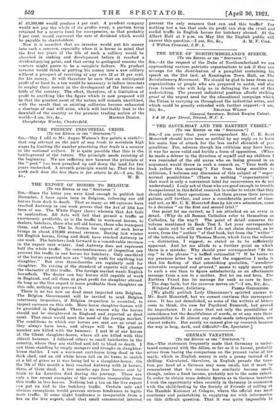THE EXPORT OF HORSES TO BELGIUM. [To TEE EDITOR OF
THE " SPECTATOR."] Sin,—Since the letter you were kind enough to publish last December, I have again been in Belgium, following our old horses from dock to death. That as many as 400 carcases have reached Antwerp in one week proves that the Act. of 1914 has been of use. The White Paper shows wherein that Act fails in application. All Acts will fail that permit a traffic so enormously profitable, as is the traffic in worn-out horses, to dealers, butchers, those who sell old horses, those who transport them, and others. The 5s. licence for export of each horse brings in about £10,000 annual revenue. During last winter 853 English horses, living and dead, have reached Antwerp in one week. The butchers look forward to a considerable increase in the export next winter. And Antwerp does not represent half the whole traffic. No conscientiousness of inspection can prevent the traffic in our horses for butchery. Only one-third of the horses exported now are " totally unfit for anything but slaughter." But over three-fourths are regularly sold for slaughter. No raising of the standard of exports will change the character of this traffic. The foreign market wants English horseflesh. The dealer can buy horses still capable of work in England, and sell them at great profit for slaughter abroad. So long as the live export is more profitable than slaughter on this side, nothing can prevent it.
There is no tax now on dead meat imported into Belgium. The Belgian Government will be invited to send Belgian veterinary inspectors, if Belgian inspection is essential, to inspect carcases on this side. More horse slaughter-houses will be provided in England. There is no reason why the horses should not be slaughtered in England and exported as dead meat. That meat would meet the need of the foreign market. The conditions to which our horses are sent are as cruel as they always have been, and always will be. The greater number are killed with the hammer. I met 16 of our horses at the Ghent slaughter-house, where all are killed with this (blunt) hammer. I followed others to small butcheries in the country, where they are stabbed and left to bleed to death. I saw them standing by empty mangers and troughs in slaughter- house stables. I saw a worn-out cart-horse lying dead in the dock shed, and an old white horse fall on its knees to snatch at a bit of grass as it was being led to a slaughter-house. On the 7th of this month a boat reached Antwerp with 24 horses, three of them dead. A few months ago four horses sent by train to La Louviere died during the journey. These are only a few recent examples of the cruelties inseparable from this traffic in live horses. Nothing but a tax on the live export can put an end to the butchery traffic. Certain safe and obvious exemptions would prevent serious hindrance to legiti- mate traffic. If some slight hindrance is inseparable from a tax on the live export, shall that small .commercial interest
prevent the only measure that can end, this traffic? For nothing but a tax that ends its profit can stop the cruel and sordid traffic in English horses for butchery- abroad. At the Albert Hall at 3 p.m. on May 21st the English public will


































 Previous page
Previous page